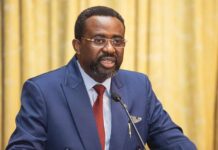President Akufo-Addo has said that his government, over the past twelve months, has brought relative stability to the power sector in place of the erratic power situation popularly known as dumsor that it inherited.
Highlighting his government’s achievements in its first year in office, the president underlined the importance of ensuring a stable power supply for industry toward job-creation and productivity.
“Adequate power supply is critical to the operation and success of industry, especially the small and medium-scale enterprises which provide the bulk of employment,” he said.
The president was speaking at a meeting with the media at the Flagstaff House, to discuss the performance of his administration in its first year of office.
He said his government has put in place various policies and programmes to ensure continuous power supply at affordable rates for households and industry.
“An Industrial Development Tariff has been approved for industry to enhance its competitiveness. A new rate of US$6.50 per Million British Thermal Units (MMBtu), as against the previous rate US$8.84 per Million British Thermal Units (MMBtu) has been established – representing a 26.5% reduction,” he added.
On the issue of the energy bond, President Akufo-Addo said that his government has reduced the debt they inherited by 50% – having raised US$2.4billion from the 7-year and 10-year cedi-denominated bonds it issued last year. He added that this has helped improve the liquidity of banks and balance sheets of state-owned enterprises in the energy sector.
Nana Addo also talked about the review of some Power Purchase Agreements previously negotiated by the erstwhile Mahama administration.
“A review of 24 power purchase agreements, which led to the termination of 11 power deals and the rescheduling of 8 others, has enabled us to save the government Treasury about US$7billion in excess capacity charges over a 13-year period,” he explained.
There are further plans to expand installed capacity, with government looking to include renewables in the energy mix to boost hydro and thermal generation.
Minister for Energy, Boakye Agyarko, last year announced moves to diversify the power mix by targetting 300MW of solar by 2020. The Bui Power Authority (BPA), in this regard, has expanded its switchyard at the Bui Generation Station (GS) to accommodate 250MW of solar-generated power.
This is in line with the energy ministry’s target of increasing renewables to about 10% of total energy mix.
President Akufo-Addo also recently announced proposals to reduce electricity tariffs by 18% (barbers), 15.7% (hairdressers and beauticians) and 9.8% (tailors) respectively.
It is however unclear how his government plans to finance such reduction, having failed to fully raise the amount required to clear the outstanding energy sector debt.










